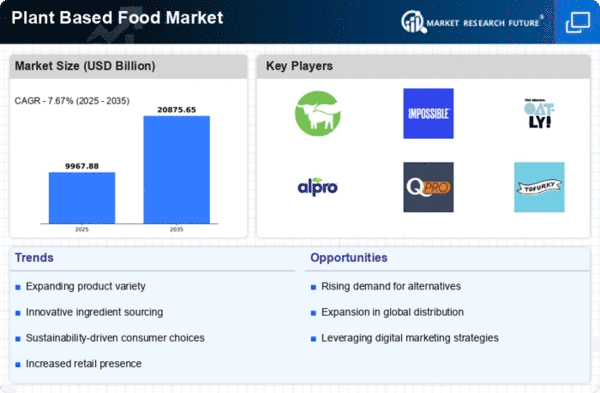Market Share
Plant Based Food Market Share Analysis
Recent years have seen a notable increase in the popularity of the plant-based food market, mostly due to customer preferences for more sustainable and healthier food alternatives. Companies are fighting for a piece of this expanding market, and success largely depends on their strategic positioning. One important tactic is to focus on specialized markets inside larger ones. By focusing on particular customer needs or health-conscious preferences, businesses may carve out a unique identity and draw in a loyal customer base. For example, some brands cater to individuals with particular dietary requirements or preferences by specializing in plant-based items that are devoid of gluten or soy. Stressing product innovation and isolation is a further successful market share positioning tactic in the plant-based food sector. With a growing selection of plant-based drones, businesses must differentiate themselves by providing distinctive and endearing goods. This might involve creating unique blends, taste combinations, or creative packaging that distinguishes them from rivals. Businesses may attract customers looking for novelty and diversity in their plant-based solutions by consistently launching fresh and innovative options. Complying with dietary and nutritional trends is also a powerful tactic in the plant-based food market. For health-related reasons, a growing number of customers choose plant-based products in search of choices that enhance their general well-being. Businesses may obtain a competitive advantage by positioning their goods as healthy and nutrient-conscious options rather than merely meat substitutes. Stressing the nutritional advantages—such as reduced cholesterol or higher protein content—can resonate with health-conscious customers and reinforce the idea that plant-based goods are a good option for leading a healthy lifestyle. Creating solid connections and working together is another successful market share positioning tactic. To increase market reach, this entails forming alliances with merchants, caffs, or other stakeholders in the food business. Businesses can increase exposure and availability by displaying well-traded retail outlet items strategically or highlighting them on restaurant menus. Plant-based companies may gain credibility by working with influencers or health experts, which will strengthen their place in the market. Similarly, a company's environmental strategy may have a huge impact on today's socially concerned customers. Businesses in the Plant-based Food Market may highlight their dedication to sustainability by using eco-friendly packaging, sourcing ingredients ethically, and maintaining an open supply chain. This is appealing to customers who wish to make environmentally conscious decisions in addition to looking for healthier options. Pricing tactics are starting to play a significant role in positioning market share. While some businesses want to attract ultra expensive customers with high-end, ostentatious items, others decide to use a more accessible pricing approach in order to reach a wider audience. Achieving a balance between quality and price is crucial for businesses as it enables them to target certain market segments and increase their market share.


















Leave a Comment